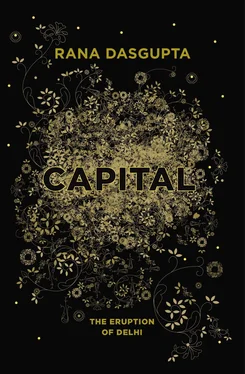Vikas Yadav had evaded conviction for murder in the past, but this time even his family’s prowess in this domain was not enough to get him off, and both brothers were eventually sentenced to life imprisonment (though appeals are still underway). But many other violent deaths in the proximity of Delhi’s power youths, however, somehow disappeared abruptly from the newspapers or were tied up in some far-fetched resolution.
At the core of the city’s soul was something dark and fatal. Like all dark things, however, Delhi held a powerful attraction. It promised terrible, forbidden pleasures. It was not only the families of 1947 refugees who manifested its cracked and volatile personality: newcomers too sensed the violence under the ground and quickly adopted the city’s ways. Delhi’s grip was nauseating and yet secretly delicious: you gave yourself to it, and you did not realise until you spoke to outsiders just how corrupt you had become. If people flocked to the city it was not because it held some promise of New York-style grandeur — “If I can make it there, I’ll make it anywhere” — even though “making it”, in the financial sense, was of course critical. It was more than that. Delhi whispered promises, even to the purest souls, of violent and demonic pleasures. Come to me, all ye who have been fucked , it told them, and I will show you how you can fuck others .
• • •
One evening, I go to a qawwali concert in the gardens of the India International Centre, a well-known cultural institution in central Delhi. A group of musicians has come from Pakistan. They take their places as the day ends. Far above, bands of shrieking parakeets, which rediscover their sense of direction when the sun touches the horizon, fly home in straight lines across the sky. The first bats are flickering among the trees.
It is a weekday and the audience members have come from offices. Tight-lipped Hindu bureaucrats in blazers and ties shuffle around in the rows of plastic seats, hassled, and not yet present to the music.
The musicians take no account of the unrest around. Their music lifts off straight away to an extraordinary pitch of ecstasy and yearning, the voices soaring one after another to the yawning sky, drums filling the static garden with dance, hands clasping at heaven. The head qawwal is a man of extra-terrestrial magnetism: portly and jowled, his fingers dart weightlessly, drawing sound in the air, and his voice is abundant with every kind of desire, spiritual and carnal. He wears a brilliant white kurta, embroidered around the neck, and a scarf which he tosses like a mane of golden hair.
Over the course of the first forty minutes or so, something amazing happens in the audience. The men begin to make twitches of enjoyment — but they are embarrassed at first, and they look around them quickly after each full-arm gesticulation, fearful of censure. But the spirit spreads and soon everyone is touched by it: their restraint leaves them and they leap from their chairs in elation, they are full-heartedly clapping, swaying and crying out. Something has entered them from the outside: their bodies are making unaccustomed movements and they are moaning with words from elsewhere. They are going to the stage to give money! — and the Hindu women cover their heads and bow before the foreigners, Salaam! Islam is pouring out of these people who lie awake at night terrified that their daughter might marry a Muslim. These people who were not even born in the days when these gestures were de rigueur, know them nonetheless.
Look at the men in the audience, these unimaginative men who love rules, who fast on Tuesdays and believe they are virtuous because they deny themselves pleasures; these suspicious men whose Brahminical anxieties keep them from eating out, mixing with strangers, or walking in the street, these dutiful men who work hard but speak poorly; look at these men who are so conditioned to murder the feminine within them that they cannot keep themselves from stamping on girls and women without — look at how they desire this Sufi on stage, the weeping tuneful beautiful Muslim whose passions overflow, the man of poetry and eloquence, the man of universal desire, the man who has not sacrificed his feeling, who has never learned that ecstasy and song are effeminate — look at how they take him into themselves and try to fill themselves with him. How his gestures infect their own, how his passion lights up their faces. Look how this Muslim can set a fire in the hearts of these Hindus and set them free — look how he can restore them to everything they have been.
A rich jeweller bought himself a Lamborghini for 35 million rupees [$700,000]. Finding it was impossible to take it out on Delhi’s crowded streets, he offered it for sale. It was bought for 22 million rupees [$440,000] by the twenty-seven-year-old son of a real-estate dealer. Newly married, the young man did not tell his family about the purchase; he hid the car and only drove it at night. At 5.30 one morning, driving at 200 kilometres an hour, he lost control of the car and crashed into barriers at the side of the road, killing himself and severely injuring a man on a bicycle.
The injured man was the fifty-five-year-old caretaker of a school who cycled an hour to work every morning because he found it healthier than travelling by bus. He had worked in the school for twenty years; each morning he had to arrive before everyone else because it was he who unlocked the doors.
On the morning of the accident, he was rushed to hospital with severe head injuries. The school offered financial assistance for his emergency surgery but further operations were required to save the man from paralysis. His son said he had no idea how the family might pay for this treatment, which, it was feared, might cost as much as 150,000 rupees [$3,000].
Looking for a new apartment, some years ago, I was taken with a beautiful place nestled close to one of Delhi’s ancient cities. The rent was far more than I had budgeted, but it was so perfect that I spontaneously handed over deposit cheques to the owner, who was a Punjabi businessman. Eighty years old, he still ran the business he had set up, which manufactured large-scale electrical equipment for sale all over the world. He was successful, and owned many properties in Delhi. His wife served tea and sweets in celebration of our deal. He told the story of how he had fled Pakistan in 1947 as a young naval officer, established a business in Delhi, and set up livelihoods for his brothers, whom he brought, one by one, to the city.
“Now we don’t talk to each other,” he said. “Punjabi families support each other fanatically when things are bad. But when they become rich it all falls apart. That’s why the Marwaris build the biggest business houses. They put the business first.”
Lying awake in bed that night, I was filled with disbelief at what I had done. I could not afford this place. The next morning I called the landlord and said I was sorry but we couldn’t go ahead with the deal. He said he was sorry too, not least because he had turned away other prospective tenants, and he asked if I could compensate him with half a month’s rent. I agreed to stop off at his place with a cheque for that amount; he said he would at that point return the cheque I had given him on the previous day. After our conversation, nonetheless, I put a stop on that cheque.
An hour later he called me. “The price of severance has just gone up. You stopped your cheque at 10.04 this morning.”
I asked him how he knew.
“Do you think I won’t find such things out?”
And he proceeded to list, just so I understood what I was dealing with, the numbers and current balances of all my bank accounts.
“You have insulted me,” he said. “Now I am expecting you to give me a cheque for two months’ rent.”
Читать дальше











